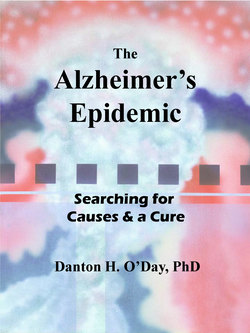Читать книгу The Alzheimer's Epidemic - Danton O'Day - Страница 14
На сайте Литреса книга снята с продажи.
The Personal Side of Alzheimer’s Disease
ОглавлениеWhat is Alzheimer’s disease? This might sound like a simple question to answer but it is not. This is because this disease is different things to different people. To a clinician or biomedical researcher, it is the buildup of bad stuff in the brain, the loss of specific nerve cells or changes in cognitive behavior. To a doctor, it’s the emotional challenge of having to diagnose a person with the disease and telling them they can no longer do the things they want to do. To a caregiver, it’s a 24-hour-a-day challenge without a positive outcome. To a family member, it’s the loss of the person they knew and loved. To the Alzheimer’s sufferer, it begins with the loss of their memory and dignity and ends with the loss of their whole world. To anyone who has seen the face of Alzheimer’s, all of these points of view are important because they all play a part in helping us understand this devastating disease. So let’s start with the currently held view of how the disease starts and progresses. Then, as we work our way through this book, we will develop this knowledge into the full picture of Alzheimer’s disease as it is understood today.
Figure 1.3. The basic stages in the progression of Alzheimer’s disease.
Alzheimer’s disease involves a progressive loss of mental ability that begins with mild cognitive impairment (i.e., decreased ability to think, reason, remember), or MCI, that can progress, in the worst case, to true dementia (Figure 1.3). One of the problems in research has been that different biomedical researchers and clinicians have formulated a diversity of stages and sub-stages for the disease. While these are well intentioned and of value for the researcher, they make it more difficult to discuss the disease in lay terms. So in this book, except when absolutely needed, the disease will be discussed in terms of mild cognitive impairment occurring as a prelude to dementia.
As we age our ability to remember things declines gradually. In Alzheimer’s disease, this decline is often more rapid and more devastating. Rather than symptoms like forgetting a name or the inability to immediately remember it, the disease is reflected in more severe memory impairment. Initially the memory loss is mild but worse than a normal individual of the same age and health. As it progresses, the person who is afflicted may not even realize where they are, even when in their own home or neighborhood. They may not recognize family members and friends. By the time the disease has affected a person’s ability to function socially or to continue in their job, they are in the clinical stage of dementia.
Alzheimer’s disease is a cruel affliction that progressively robs a person’s sense of self and awareness. Following a pathway to cognitive oblivion, it turns loved ones and friends into strangers and, at its worst, enemies. The very world in which the Alzheimer’s sufferer lives becomes foreign if not frightening, as altered brain cells slowly erase that person’s past and their grip on reality. Then those brain cells die, signaling the final stages of this horrific disease.
The problem with Alzheimer’s disease is that it is not like typical medical disorders like heart disease, diabetes or even cancer. Those diseases have specific symptoms that, for the most part, are clearly definable. In most cases, medical intervention and well-defined approaches for a cure are available. The course of these diseases is also fairly predictable. This is not the case with Alzheimer’s. There are multiple pathologies associated with the disease. The disease is person specific and doesn’t follow a predictable pathway. There are no available cures and even attempts to slow the disease are not well developed.
